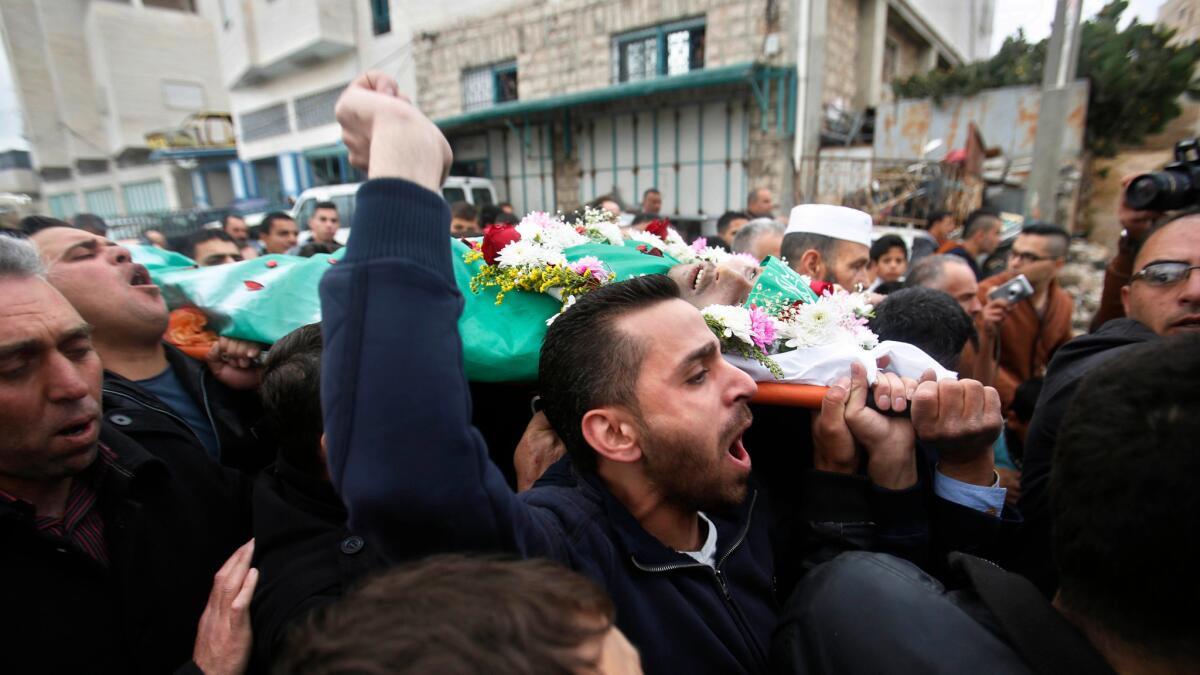Israeli soldier takes the stand at his court-martial for killing a Palestinian assailant

Reporting from JAFFA, Israel — An Israeli combat medic who faces manslaughter charges in the shooting death of a Palestinian assailant defended himself for the first time in public on Sunday, telling a military court that he made a “split-second” decision to save the lives of others at the scene.
Israel Defense Forces Sgt. Elor Azaria, 20, is on trial for the March 24 killing of Abdel Fattah Sharif in the West Bank city of Hebron. Sharif had participated in a stabbing attack on soldiers and was lying on the ground after being shot. A second Palestinian knife assailant had already been killed.
A video of the incident published by an Israeli human rights group shows Azaria cocking his gun, walking toward Sharif and shooting him in the head. Palestinian leaders have called for a United Nations inquiry into the killing, and U.N. special coordinator Nikolay Mladenov condemned it as a “gruesome” extrajudicial execution.
After months of silence, Azaria lashed out at his commanders and the military top brass, accusing them of making him a scapegoat. Giving his version of the incident for the first time, Azaria told a three-judge panel and a courtroom packed with reporters that he feared Sharif might detonate an explosive or grab a knife nearby to injure soldiers on the scene. He said he felt an “immediate” threat after the Palestinian assailant moved his head and arm.
See the most-read stories in World News this hour »
“I understood that I had no choice,’’ he said, speaking in response to questions from his defense attorneys. “In the field, it’s only a matter of a split second… I acted according to the only alternative that I saw at the time.”
“In my opinion, I saved lives.”
The politically charged trial has transfixed many Israelis amid a wider debate on how to handle a 10-month wave of stabbings, shootings and car rammings that have left dozens of Israelis dead, as well as hundreds of Palestinians, many of whom Israeli authorities accused of carrying out attacks.
Much of the discussion has focused on whether the security forces’ open fire rules are too lenient. Government officials including Defense Minister Avigdor Lieberman and Public Security Minister Gilad Erdan have advocated for assailants to be killed on the spot, rather than arrested, in order to deter new violence.
“No terrorist should get out of an attack alive,” Lieberman wrote on Facebook in October 2015, when he was part of the parliamentary opposition.
Oren Hazan, a member of parliament from Prime Minister Benjamin Netanyahu’s Likud Party, called the trial a “farce” and sat with Azaria’s relatives in court. “Soldiers are dealing with complex daily realities,” he said. “You should eliminate terror, not caress it.”
At Sharif’s funeral in May, his father, Yusri, said that he didn’t believe the military court would do his son justice, and that the court-martial was meant to mollify international opinion.
Azaria’s remarks follow weeks of testimony from commanding officers that there was no operational justification for the shooting. The prosecution is arguing that Azaria’s account of the events changed over the course of several interrogations once he knew he would be accused.
His company commander told the court that Azaria said Sharif “deserved to die” shortly after the incident. Azaria denied he made such a remark and accused his commanders of lying about the incident.
Azaria said soldiers in Hebron are on constant alert because of the threat of confrontations. At the time of the stabbing attack, he said soldiers had received intelligence that Hamas operatives would carry out a large-scale attack. He said Sharif aroused his suspicion because he was wearing a heavy black jacket on a warm day, and that someone yelled out that he was wearing an explosive.
The medic criticized other soldiers at the scene, who were standing nearby but not paying attention to Sharif in the video, as “complacent.’’
He also accused Defense Forces Chief of Staff Lt. Gen. Gadi Eisenkot and then-Defense Minister Moshe Yaalon for rushing to find fault.
“I feel betrayed by my commanders,’’ he said. “They threw me to the dogs” out of fear of the uproar created by a “biased” video, he continued.
The Israeli army spokesman’s department declined to comment on Azaria’s testimony.
The testimony lasted approximately five hours before the defense said Azaria was exhausted and asked to adjourn until Monday, when the military prosecutor is scheduled to begin a cross-examination.
Ilan Katz, Azaria’s chief defense attorney, said Azaria felt “abandoned on the battlefield” and faulted army top brass for not taking his account into consideration.
“They rushed to judge the soldier,” he said.
Mitnick is a special correspondent.
MORE WORLD NEWS
How a stockpile of America’s nuclear weapons got tangled up in a Middle East crisis
Gunman in Munich mall shooting identified as an 18-year-old German Iranian
More than 170 dead in China flooding; many still missing
More to Read
Sign up for Essential California
The most important California stories and recommendations in your inbox every morning.
You may occasionally receive promotional content from the Los Angeles Times.








